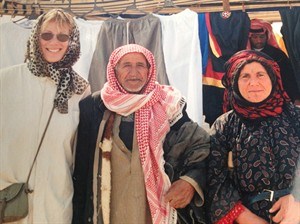
Colleen Friesen (left) is pictured in Syria in a undated photo. THE CANADIAN PRESS/HO
September 15, 2014 - 11:28 AM
TORONTO - After succumbing to afternoon sleepiness during a visit to Paris, Colleen Friesen was determined not to let jet lag extinguish her energy on a return trip to the City of Light.
Even as rain poured in the French capital, Friesen was intent on being outdoors to help acclimate to the time change. But even before she embarks on trips across multiple time zones, the frequent flyer has developed a system to help stave off jet lag.
"The darker your bedroom, the better for your sleeping. So, I take an eye mask and ear plugs, I do the whole sensory deprivation thing," said Friesen, a Vancouver-based travel writer who has visited more than 50 countries including India, Syria and the U.K.
Three nights prior to departure and three nights after arrival, she takes melatonin prior to bedtime. Health authorities recommend individuals consult with their doctor prior to taking the supplement.
Once Friesen arrives at her destination, she adopts the local time — which includes staying out in the light as long as possible.
"There's a couple of moments where you're tired the first couple of days at inopportune times but nothing that's debilitating, and certainly something that you can walk through."
Friesen's approach to fighting jet lag is in line with advice from medical experts who suggest individuals spending extended time abroad should adjust their routines to the local time of their destination.
Jet lag occurs when there is a mismatch between the time of a person's internal clock — or circadian rhythm — and the local time as a result of rapid travel between different times zones, said Dr. Jay Keystone, medical director of the Medisys Travel and Adult Immunization Clinic in Toronto.
The circadian clock is centred in the hypothalamus in the lower part of the brain and is responsible for modulating blood pressure and heart rate. Next to the hypothalamus is the pineal gland which produces melatonin, which Keystone described as "the hormone of darkness." The release of melatonin is what signals to the body that it's time to sleep.
"Darkness increases melatonin production, light stimuli reduces it," said Keystone, staff physician in the tropical disease unit at Toronto General Hospital.
"But the problem is... as soon as you go through multiple time zones, your time clock is now thrown off and it takes at least a couple of days — two to three days — before it can catch up to the current time zone. And that's why we wind up with jet lag.
Dr. Gregory Belenky, research professor at the Sleep and Performance Research Center at Washington State University Spokane, said tourists should get acclimated to the local time with respect to the normal light-dark cycle, meaning bright light exposure in the morning and dim light in the evening, he added.
"Someone who's not a frequent traveller ... the best recommendation is to sleep as much as you can on the plane, take melatonin two hours before you want to fall asleep on the plane and continue the melatonin two hours before the new bedtime in the new location."
Belenky said most people have a slight tendency to stay up late and sleep in which is why most typically find it easier to travel west than east.
"The problem with going to be bed early is that your body temperature is rising. It peaks around 10 in the evening, and so you're not going to be able to fall asleep much before 10:30 usually unless you're really sleep-deprived."
Jay Olson had always seen jet lag as a necessary component of travelling over many time zones and never tried to use a particular strategy to reduce its effects.
"I would just sleep when I was tired at the destination, but often that would lead to me missing out on exploring the city and all the things you like doing when travelling," said Olson, who is completing a master's in psychiatry at Montreal's McGill University.
He developed Jet Lag Rooster while working as a psychology teaching assistant at B.C.'s Simon Fraser University. The website and mobile app allow travellers to create a customized plan to help shift their body clock in order to reduce or prevent jet lag.
Users key in their cities of departure and arrival and their typical sleep-wake patterns and have the option of shifting sleep schedules to the new time zone before departure, after departing on the plane or after arrival. The plan also offers guidelines to "seek light" — go outside in sunlight or use a portable light box — as well as ideal sleep periods and other tips to reduce fatigue.
Olson said the method was based on research published in scientific papers for decades. "What was missing was a simple method of translating this knowledge into some of these particular trips, because the guidelines vary for each person based on when they sleep and for how many time zones they travel."
He first tried the method himself a few years ago when he flew from Vancouver to New York by starting to shift his body clock before he flew and said he experienced no jet lag.
Keystone said for travellers heading eastbound more than three time zones, they should try to go to bed a little earlier each night for two or three days before departure because the day is shortening. If travelling westbound, it's the opposite — snooze a little later.
— Follow @lauren_larose on Twitter.
___
Online:
www.colleenfriesen.com
www.jetlagrooster.com
www.medisys.ca/en-ca/travel-health/travel-health-clinic
http://spokane.wsu.edu/researchoutreach/Sleep/
News from © The Canadian Press, 2014